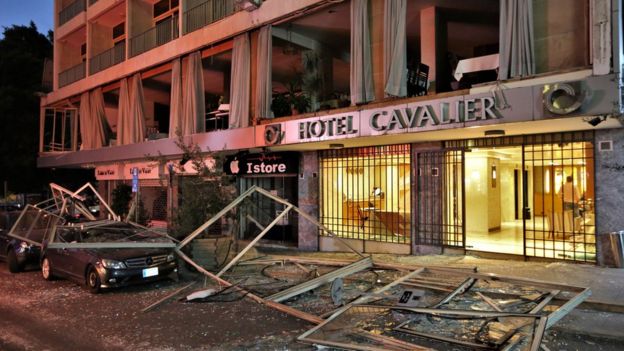Beirut blast: Lebanon in mourning after massive explosion
Lebanon is in mourning after a huge explosion in the capital Beirut killed at least 78 people and injured more than 4,000 others on Tuesday.
The whole city was shaken by the blast, which began with a fire at the port which exploded into a mushroom cloud.
President Michel Aoun said 2,750 tonnes of ammonium nitrate had been stored unsafely in a warehouse for six years.
He scheduled an urgent cabinet meeting for Wednesday, and said a two-week state of emergency should be declared.
The country will observe an official period of mourning for three days from Wednesday.
President Aoun also announced that the government would release 100 billion lira (£50.5m; $66m) of emergency funds.
"What we are witnessing is a huge catastrophe," the head of Lebanon's Red Cross George Kettani told local media. "There are victims and casualties everywhere."
Rescue workers are continuing to search through rubble and the death toll is expected to rise.
Officials said on Tuesday that an investigation was under way to find the exact trigger for the explosion. Lebanon's Supreme Defence Council said those responsible would face the "maximum punishment" possible.
The ammonium nitrate had reportedly been unloaded from a ship impounded at the port in 2013, and then stored in a warehouse there.
The explosion comes at a sensitive time for Lebanon, with an economic crisis reigniting old divisions as the country struggles with the coronavirus crisis. Tensions are also high ahead of Friday's verdict in a trial over the killing of ex-Prime Minister Rafik Hariri in 2005.
What happened?
The explosion occurred just after 18:00 (15:00 GMT) on Tuesday. A BBC journalist at the scene reported dead bodies and severe damage, enough to put the port of Beirut out of action.
Local media showed people trapped beneath rubble. A witness described the explosion as deafening, and video footage showed wrecked cars and blast-damaged buildings.

"All the buildings around here have collapsed. I'm walking through glass and debris everywhere, in the dark," one witness near the port told AFP news agency.
Hospitals were said to be overwhelmed and many buildings were destroyed.
The blast was also felt 240km (150 miles) away on the island of Cyprus in the eastern Mediterranean, with people there saying they thought it was an earthquake.
'Hard to imagine a worse time for this to happen'
By Rami Ruhayem, BBC News, Beirut
Their sirens wailing, ambulances inched their way through heavy traffic to get to the site of the blast. Shards of glass blanketed the highway leading into Beirut from the north, as a tractor cleared the rubble.
There's never a good time for such terror to strike a city, but for Beirut, it's hard to imagine a worse time than this.
With Covid-19 infections on the rise, hospitals were struggling to cope. Now, they're faced with thousands of injuries and expecting thousands more.
Hundreds are now displaced; their homes reduced, in a split second, to a twisted, uninhabitable mess of glass and debris.
Lebanon imports most of its food; its economy has been in freefall for almost a year, amid fears of widespread food insecurity to come.
Now all the grain that was stored in the port is gone. In fact, Beirut port itself "is no more", one official said.
Even after the shock fades away, the impact will be hard to fathom.
อ่านต่อได้ที่. ฟุตบอล ออนไลน์ ,เว็บแทงบอลUFABET